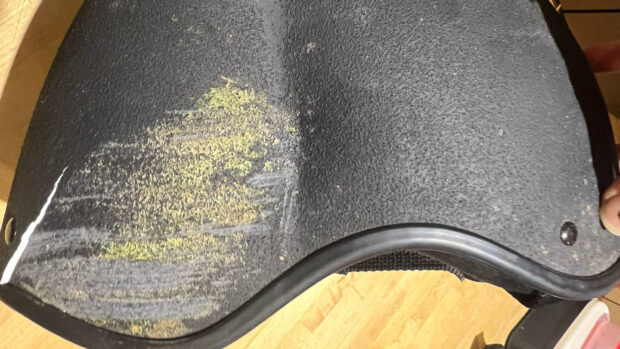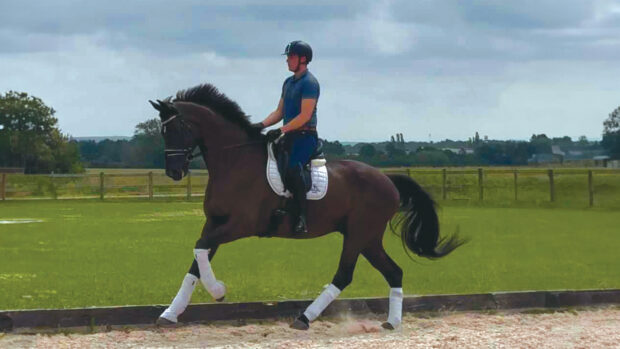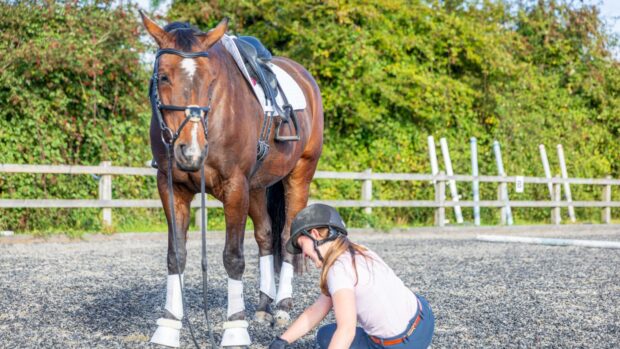In February 2017, the life of then Flat jockey George Baker, changed forever when he suffered a life-threatening fall while racing on ice at the White Turf meeting in St Moritz.
He recently opened up to Lauren Braithwaite and Tina Scargill from Racing Welfare on their new podcast On Track, Off Course about his injury, rehabilitation and how he coped with intrusive and unwelcome thoughts. He details the help he has received from within the racing industry and the fundamental importance of mental health support.
George was at the height of his career when the accident occured, having won his first Classic five months previously.
“I can laugh about it now, but it’s taken a while to get to this point. I suffered a big head injury in St Moritz, and the journey back has been character building, shall we say,” says George.
He had to learn to walk again and had problems with his eyesight initially.
“I was basically a 34-year-old baby who did some very strange things in hospital and put a lot of pressure on those closest to me — it was a very strange time. I’m really lucky because I don’t remember anything about it — I was in post-traumatic amnesia for four weeks. Anything that came into my head came out of my mouth, and that is not a good thing when you have attractive nurses washing you etcetera!”
George was flown back in a medical jet to London after eight days in hospital in St Moritz. The Injured Jockeys Fund and Dr Jerry Hill organised for him to be admitted to Wellington Hospital.
“It was the most wonderful hospital and I received the best care — I used to call it the hotel,” laughs George. “They completely rebuilt me. I really embraced the whole process of getting better — all I wanted to do was get back race riding, and fortunately nobody told me that it wasn’t going to be possible as that kept me going early doors. It was only when I got home from hospital that I realised I wasn’t going to be able to fulfil that goal I’d initially set myself.
“My balance was so bad and I was physically a much different person to the one I once was, but I still wanted to get back in the saddle. It was only when I watched a documentary called The Crash Reel, about a snowboarder who suffered a similar scenario to me, that it dawned on me I wasn’t going to be a jockey again. As the programme went on, I could relate heavily to it and I started to cry. I’m not someone who cries much, but it really hit home and I accepted that my career in the saddle was over just by watching that one programme.”
Then it was time for George to visit Dr Hill in Lambourn for the devastating blow he knew was coming his way.
“I said to my wife Nicola en-route, ‘I’m going to hear the news today that this is the end — George the jockey is over’, and I cried again. But I’m glad I had come to the realisation it was over before I was told for sure it was over,” he explains.
Since then, George has written a book, which he said really helped with his mental health.
“Writing the book essentially bookended that part of my life, and that was a very helpful process. I also went to a unit in Oaksey House called Hobbs Rehabilitation, where they taught me how to do simple tasks again, like making a cup of tea and eating properly.
“Ben Papps, the neuropsychologist there helped more than anyone else too. At one stage I was going there twice per week, and I talked to him a lot about weird thoughts I was having. For example, once I was at Royal Ascot in a friend’s box on the first floor, and while in there I thought, ‘I wonder if I can jump off this balcony?’ — not because I was thinking of killing myself, but it was just my mind playing tricks on me, as Ben then explained. It was a strange journey and it’s important to get the right help.
“He made me feel normal again — I didn’t know what I was going to do job-wise, I had a young family and I had to get back driving too. I had amazing friends and family around me too.”
Article continues below…
You might also be interested in:

‘The lights were on, but there was no one at home’: ex-jockey George Baker on his life after horror fall
In his new book, the former top jockey reveals his journey after the horror fall which left him with serious

Former jockey who had to learn to walk again after life-changing fall to run London Marathon
‘I know that tackling a marathon is a challenge for everyone, but as my balance is not what it was,

Subscribe to Horse & Hound magazine today – and enjoy unlimited website access all year round
But George has found a life after being forced to retire from the saddle.
“I now work for Racing TV as a pundit, I do part-time work helping trainer Ed Walker with his race planning, which I really enjoy as I missed being in a yard environment after my fall, and I’ve just qualified as a jockey coach too.”
Racing Welfare’s services are open to anyone who works in, or is retired from, the thoroughbred breeding industry. If you would like to get in touch for support with your physical or mental health you can contact Racing Welfare 24/7 by calling 0800 6300 443 or go to www.racingwelfare.co.uk.
You can listen to On Track, Off Course by heading to https://soundcloud.com/ontrackoffcourse.
Horse & Hound magazine, out every Thursday, is packed with all the latest news and reports, as well as interviews, specials, nostalgia, vet and training advice. Find how you can enjoy the magazine delivered to your door every week, plus options to upgrade to access our H&H Plus online service which brings you breaking news as it happens as well as other benefits.



